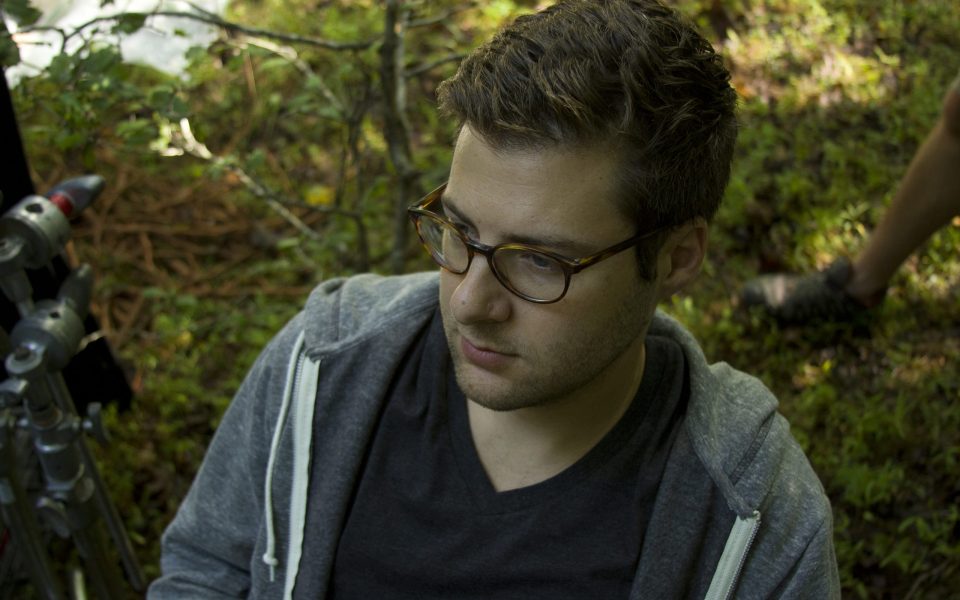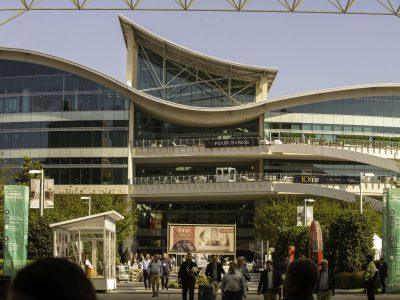Photo courtesy of Andrew Palermo
Andrew Droz Palermo is the director and cowriter of the 2015 feature film ‘One & Two,’ which was shot near Winston-Salem with funding from the Sundance Institute. In the film, Eva and Zac are siblings with supernatural abilities plotting escape from their family of religious fanatics who hold tight to 1800’s technology and live within the confines of a concrete wall. You can find One & Two on cable VOD and on ITunes.
by Daniel Wirtheim
Triad City Beat: What made you decide to film in Winston-Salem?
Andrew Palermo: We came for the tax incentives, which obviously are now gone. But we were fortunate enough to get in there and do it and we found a great location in the area.
TCB: Did anything change in the script while you were out here?
AP: There are a lot of things in Horne Creek that were just coincidental that were there, things that I wrote very specifically and they happened to be there on location. But then there were other things that I was really interested in and they weren’t in the script. There was a well that I really liked and I wrote something utilizing the well. Other locations are the same way, you see a great spot and it changes and dictates what they do a little bit.
 Photo courtesy of Andrew Palermo
Photo courtesy of Andrew Palermo
TCB: What made you want to write a script like this, about a family living in isolation and religious fundamentalism?
AP: I was living in Missouri at the time and was around a lot of Amish and Mennonite. My cousin was working with them and I was interested in the way they were living and started thinking about pushing the way they live even further into an even more isolated way. And all of that was sort of mixed with a recent interest in feral children as well. I was reading a lot about feral children.
TCB: I’m sure a lot of the fledging filmmakers would want to know how you wrangle in the budget for a film like this.
AP: I want to start by saying that a number of UNCSA graduates and even current students worked on the film from the camera team to the art team and sound. Lots of people from the school worked for us, which was great. They were all really great kids and I was surprised at how much they already knew and it seems like the school is really equipping them well and that’s great.
As far as budget is concerned, it’s tough. I think that’s one of the hardest things right now to do and we thankfully were supported by the Sundance Institute, which is a nonprofit that’s of course connected to the festival but has its own mandate. And that is to help underserved artists and to help people with diverse stories. I wrote this script and my producer Kim Sherman applied to the labs and we were really thrilled to see that they wanted to support it in their Producers Lab. And through that we were able to meet some different people and we met people at this non-profit thing called Independent Filmmakers Project in New York City and we met Protagonist Pictures, which is their foreign film distributor and also a minority investor in the film and all that sort of snowballed into meeting the guys that are our majority investor called Bow and Arrow. They’re really great guys and willing to take a risk on filmmakers who have not yet made features and they were really supportive throughout the process.
 Photo courtesy of Andrew Palermo
Photo courtesy of Andrew Palermo
TCB: What did it take for you to become a filmmaker? I mean, what advice could you give to those students who want to be filmmakers?
AP: I think I always have a very intense drive to just do it and do it myself and do it any way I could and I think that’s one of those things that when I look back was one of my greatest assets. I think that a lot of young filmmakers are really stuck in thinking about how are they going to find the money or how are they going to find the perfect camera or the perfect crew or actors. And for me it was always like I’m going to learn it. I’m going to be the best camera person I can be and I’m going to learn sound as much as I can and I don’t care that I don’t have the money to do the thing that makes another movie look amazing, but that’s not my movie. Mine is a very small thing. At the beginning there’s a real challenge to give yourself the permission to do it, that’s how it is for a lot of people. And I really benefitted from just doing it and not stopping and not considering myself with permission.
TCB: In your film, the kids, Eva and Zac, can teleport anywhere if they can make a mental image of the place. If you could teleport anywhere, where would you go?
AP: I’ve been working a lot lately so I would probably find myself in Belize or something. I would want to go to some sort of beach-y location and get some R&R.
Join the First Amendment Society, a membership that goes directly to funding TCB‘s newsroom.
We believe that reporting can save the world.
The TCB First Amendment Society recognizes the vital role of a free, unfettered press with a bundling of local experiences designed to build community, and unique engagements with our newsroom that will help you understand, and shape, local journalism’s critical role in uplifting the people in our cities.
All revenue goes directly into the newsroom as reporters’ salaries and freelance commissions.





Leave a Reply